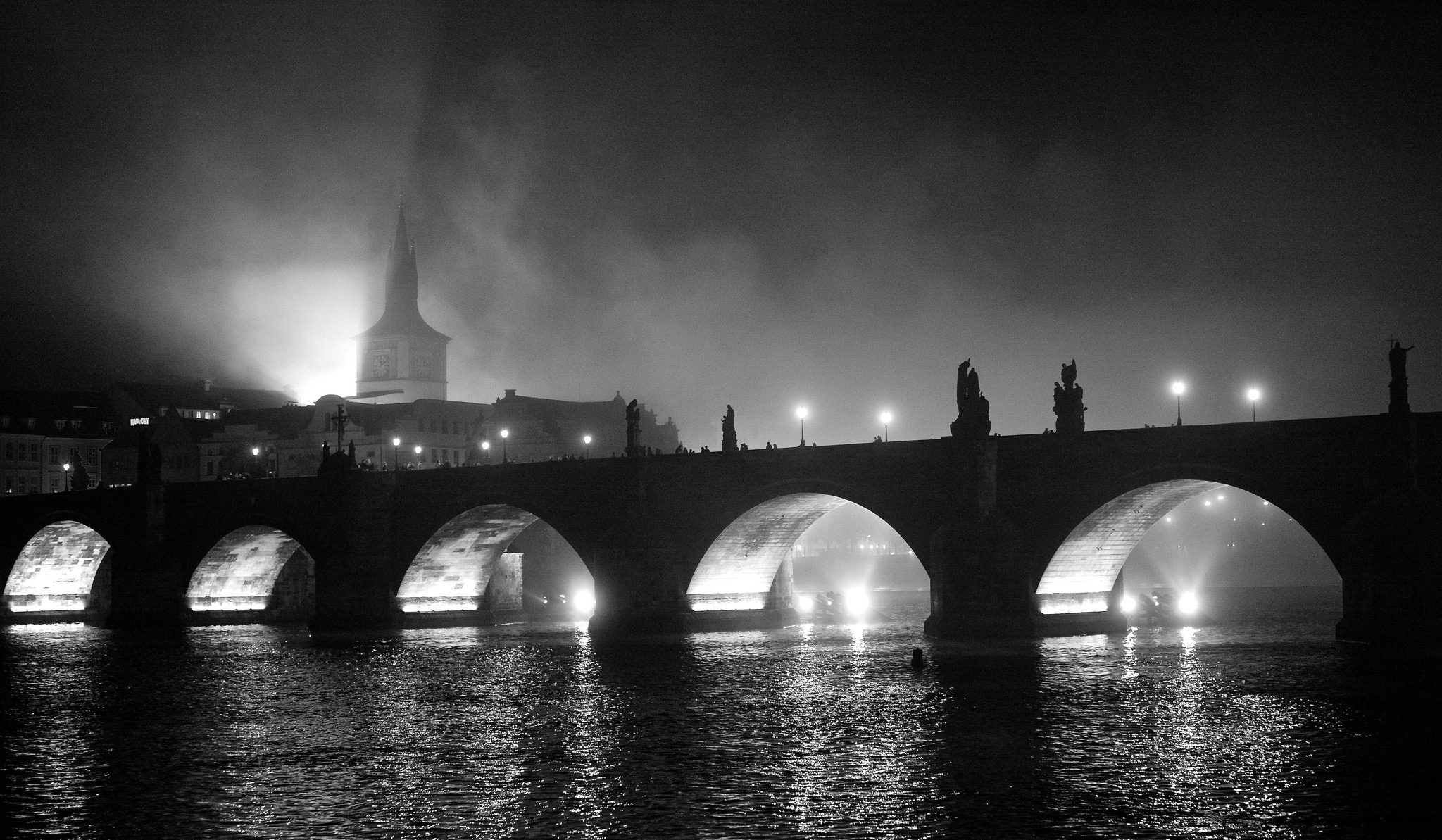Waiting for a leader?
Notes from the Czech Republic and its increasingly dangerous underground
The Czech Republic elects a new chamber of deputies on 20-21 October. The ANO party of Andrej Babiš, a billionaire businessman, is leading the polls; meanwhile, President Miloš Zeman gladly accepts the sobriquet ‘the Czech Trump’. In an article from the landmark 50th edition of Eurozine partner journal Transit, Jiří Přibáň explores what is going on.
With Czech society in its current state, the Czech Republic, like other national societies all around Europe and elsewhere, is starting to look dangerously like it is waiting for a leader. Not a leader with a capital ‘L’, with everyone unreservedly buying into what he says and acquiescing wholly to his will. Czech society, so far, remains too healthily sceptical for that, and its current economic and political condition is too good for these dire consequences. Nonetheless, leaders are increasingly starting to emerge who, on the pretext of protecting society from all manner of ills (not least ‘social misfits’, corruption, the political opposition, Brussels red tape, judicial activism, biased public media and, of course, immigrants), would like to tamper with the meaning we normally associate with the term ‘democratic society’.
In other words, Czechs are experiencing a crunch time when decisions are being taken on whether our democracy will remain a constitutional democracy that also happens to be liberal in the sense that it espouses civil liberties and rights, or whether it will become a populist democracy in which such freedoms play a secondary role. With spiralling attacks by politicians on the mainstays of our constitutionalism accompanied by waning confidence in its capabilities, those who promise the electorate various forms of ‘political cleansing’ are the ones elbowing their way to power. Most important of all in this regard is the question mark in the title of this essay, hinting at the perils of such an eventuality but refusing to perceive it as an historical inevitability.

Photo: Roman Boed. Source: Flickr
The end of opposition?
The political expectations associated with the post-1989 changes are starting, almost three decades down the line, to turn into a dangerous state of collective neurosis in central European countries. The main symptom is the complete disintegration of trust that has fractured no fewer than three levels of political life: citizens’ trust in their politicians; trust between the government and the opposition; and ultimately, where applicable, mutual trust between coalition government members themselves. A country can hardly be governed smoothly in the absence of coalition trust, the state cannot function if there is no trust between the government and the opposition, and the very idea of democracy crumbles when deserted by the trust of its citizens.
The entire political system of post-communist democracies is thus pervaded by this current deep distrust, though it is manifested differently in each country. In 1989, constitutional democracies triumphed over totalitarianism in Europe in an epoch-defining political rupture, culminating in what the French sociologist Raymond Aron had previously called the decline of political dogma and of the secular religion that was communism. Nowadays, however, democracies in central Europe are faced with the risk that the complex edifice they have painstakingly constructed will come crashing down, ruined by poor quality building materials.
This is not an outright Weimar Republic crisis, commonly referred to as a tragedy of democracy without democrats, but rather a crisis of the interpretation of the very concept of democracy. Whereas the philosopher Karl Popper once described democracy as the best means of divesting politicians of power without bloodshed, today the powerful view the concept of democracy primarily as a way in which they can most effectively keep hold of power in perpetuity once again. These politicians not only flirt with the destruction of the political opposition, but also rail against the impersonal rule of law and the general legislative process. This is paving the way for a new nomenklatura, which is doing all it can to change the rules of the political game in order to assume permanent political command and snag the ensuing economic and other social privileges.
This nomenklatura has already established an economic system far removed from a market economy; we might describe it as a tribal economy in which the different political parties and their elites are bought by various business groups. Now, though, the nomenklatura is striving – along the lines of the tribal economy – to fashion tribal politics, and avails itself of the worst forms of populist propaganda to eliminate opponents. As noted, for example, by Viktor Orbán in one of his speeches, the right represents the homeland and therefore can never be in opposition. Even the new Hungarian constitution, this unique document of constitutional counter-revolution, has replaced the republican ethos with a tribal concept of nation and state.
Similarly, the Kaczyński brothers promised a Fourth Republic in which Pole would no longer quarrel with Pole, corruption would be eradicated together with the consumer society, and everyone would work for the national good. This vague promise of the regime change from the first decade of this century has now become the government’s official policy, as if the democratic opposition and the constitutional rule of law were merely an ulcer that had to be removed in order to finally restore the unity of the nation and round off its moral cleansing, thus far impeded by the treacherous opposition, whether liberal, social democratic or post-communist. And the idea of national unity combined with a nagging feeling of external and internal threat is also a perilous constant in Slovakia.
Who is sovereign?
Law and power – these are ancient concepts that are so close and yet so far apart. Even though one cannot exist without the other, they are routinely in conflict with each other. Had he been ignorant of this friction between law and power, Plato could never have written The Republic, and he would certainly not have advised the rulers in Syracuse how to manage their polity. When philosophers fall prey to the temptation of power, can the blame be laid at the door of politicians, particularly if they have seized power perfectly legitimately according to constitutional rules in free elections?
It makes sense that, in a modern democratic society, it must be possible to rewrite the constitution, because – unlike traditional societies and theocracies – democratic constitutions do not derive their power from age-old or God-given commands. While the people in a democracy are sovereign, their will still needs to be represented in the political arena by representatives, who may even rewrite their constitution. In constitutional law, this situation – where the people hold constituent power but are unable to exercise it except through bodies of constitutional power – tends to be referred to as the paradox of constitutionalism. Another way of describing it would be to say that the people are a sovereign who cannot decide on anything.
Ever since the Abbé Sieyès – shortly before the outbreak of the French Revolution – eloquently asked ‘What is the Third Estate?’ in his January 1789 pamphlet, we have known that the answer is all of us who, irrespective of any differences of estate, subscribe to a common political nation. Sieyès’ call to dismantle differences of estate, of course, was heavily inspired by Rousseau’s political ideas on the general will and the social contract. It was not Rousseau, though, but Sieyès who wrought the transformation of the Estates-General at the National Assembly. This was the first time that the people on the European continent felt they had a chance to be represented in their political will and, at the same time, to act as its supreme executor.
The historical moment when the Abbé Sieyès asked who should have their power represented in the state and who should exercise that power, however, was also the starting point for the history of the many different demagogues and leaders who have constantly asserted that they know the correct answer to the question and know who the people are, ergo they are the only proper representatives of the popular will.
Modern democracies will always contain a populist element, reflecting the people’s disgruntlement that, the constitution and laws aside, there is no way for their will to be represented or their views heard. A problem arises when those who claim to be executors of the popular will come into power and change the constitution primarily to facilitate and secure for themselves the exercise of power in the future while blocking anyone else from expressing the will of the people. At this point a constitutional democracy turns into a populist democracy able to dispense with the rule of law because all it requires is iron-fisted domination.
The end of corruption?
Compared with other central European republics, at first glance the Czech Republic might seem in a better shape in which, while there is competition for political power, there is no quibbling about the substance of the regime. Appearances are deceptive, however, as public distrust here is the same well of political instability as in other countries and politicians’ attempts at constitutional sea change date back to the time of the opposition pact between the ODS and the ČSSD which established political and economic spheres of influence and corrupt practices at the turn of the millennium.
Another thing we have in common with other central European countries is a phenomenon dubbed ‘dirty togetherness’ by the Polish sociologist Adam Podgórecki, the idea of which is that the ruling elite clings to the reins of power because its members have too much dirt on one another. Much like criminal organisations, the cohesion of an elite of this nature is dictated, whether on a local, district or national level, by how much each member can be intimidated.
There was a time when complicity in practices such as the pilferage of building materials by local officials or the liquidation of political opposition by a decision of the Politburo would secure allegiance among members of the ruling nomenklatura. One of the aims of the democratic revolutions of 1989 was to smash these rings and their practices of dirty togetherness. Absolute distrust of the communist government was to be displaced by trust in a democratic government built on general laws and on publicly policed and constitutionally limited powers.
Even glossing over communist officials’ prowess in adapting overnight to the fabric of a free society in order to preserve their social privileges, before long it transpired that the practices of dirty togetherness were not specific to the communist regime, but were a much more deep-seated pattern of social behaviour rooted in central European societies’ traditional wariness of the state, its laws and institutions. The naïve post-revolutionary expectation that ‘everything will turn out OK’ thus gave way to the equally dangerous resignation that ‘it’s all the same, if not worse than before’. This plus ça change environment is a breeding ground not only for the full gamut of conspiracy theories that former communists and dissidents were in cahoots with each other, but also for the kind of populism proclaiming that its prime political objective is to sweep away all manifestations of dirty togetherness.
Such abuse of the rhetoric of standing up to corruption and of purging politics was poignantly exemplified in the 2010 parliamentary elections by the success of the Public Affairs (Věci veřejné) party. In the next elections in 2013, as it exited the political stage Public Affairs dropped the ‘political cleansing’ baton, only for it to be picked up by the explicitly anti-political ANO movement and the even thornier Dawn (Úsvit). While the openly xenophobic Dawn’s unexpected win of nearly seven per cent of votes propelled it to the ranks of the parliamentary opposition, the ANO movement hoovered up the electorate’s protest votes on such a scale (16.5 per cent) that, against the wishes of its leader and billionaire entrepreneur, Andrej Babiš, it instantly found itself in the governing coalition on an almost equal footing with the Social Democrats.
The leaders of these anti-political parties clearly understood that, in the eyes of most citizens, the corruption rife in Czech politics was a huge problem and that not only had the major political parties failed to address it, they had become a core component of it. Hence, on the pretext of standing up to corruption and of purging politics, power is snatched by people whose political motives are at best dubious and at worst ominous, if not downright sinister.
Brothers, where are you?
Corruption, as a legal and criminal problem, should therefore be rigorously insulated from the populist propaganda of the ‘fight against corruption’. The Coen brothers’ famous film O Brother, Where Art Thou? illustrates our current situation well. One of the subplots of this exquisite American variation on Homer’s Odyssey is the election campaign for the gubernatorial seat in the southern state of Mississippi, in which the incumbent is up against an unknown challenger, Homer Stokes, a man pledging to crack down on corrupt practices. As it turns out, however, this candidate is secretly an Imperial Wizard in the local Ku Klux Klan. The mellifluous promises to clean up politics and ‘sweep away the filth’ thus mask a dangerous vision of racial purity and supremacy. Any open talk of this would be ill-advised, hence it can be shared and espoused only through furtive, blood-related communities. Indeed, Stokes’ campaign only comes to a grinding halt when, at one meeting, he openly vents his racist views without realising that a radio is broadcasting everything live.
In the Czech Republic, too, racism and nationalism can easily become a conduit to power and a means of shoring up party positions. The scandal surrounding Ladislav Bátora, the man at the head of the semi-fascistic D.O.S.T. movement who was reduced to the position of adviser to the education minister (a post allocated to the coalition’s minority Public Affairs party) rather than being appointed as the deputy minister per se in 2010 only after express protests by the prime minister, remains fresh in the political mind. This extremist, previously a candidate for the far-right National Party, had even enjoyed the public support of the country’s president, Václav Klaus, who, impudent as ever, had no qualms about comparing the castigation of Bátora to the Hilsner Affair.1
What we witnessed here were not merely outbursts by a couple of crazies mingled with the poor taste of certain politicians and public officials that should have been consigned to the past. Only a fool would believe that this is nothing more than the idle chatter typical of Czech pubs and bars. Conversely, the attempt to forge an alliance between the ‘political purification’ touted by the Public Affairs party and the ‘nationally pure’ president and his sympathisers as the first decade of the present century yielded to the second should be seen as a sign of enduring danger to the Czech constitutional democracy that still lingers and will continue to loom in the foreseeable future, as proven by the electoral groundswell for the Dawn movement in the 2013 parliamentary elections and the ever coarser and xenophobic statements of the Czech President Miloš Zeman, who proudly identifies with being called ‘the Czech Trump’. If the anti-political ANO movement of Andrej Babiš wins the parliamentary elections this month and Miloš Zeman is re-elected several months later in January 2018, Czech constitutional democracy could be subverted in the same way that Viktor Orbán has wrought havoc on the Hungarian constitutional republic since returning to power in 2010 and in the same way as institutions that are democratic on paper are moulded by politicians of Vladimir Putin’s ilk in their own image.
A political alliance of this nature, however, is straight from the realm of the Ass and His Shadow, of which Jiří Voskovec and Jan Werich, two very distinguished actors and playwrights, warned in a play of the same name at the Prague Free Theatre in the 1930s. The threat that a coalition of unscrupulous entrepreneurs and xenophobic nationalists, legitimised by the struggle for the political and moral cleansing of society, could come to power should at last prompt politicians from the main democratic parties to marshal themselves in readiness to stand up for the constitutional democracy, and make them realise that if their parties fail to defend the public space of the democratic agora, the position they have abandoned will be populated by those who, sooner or later, will ‘sweep away’ not corruption, but those parties and all of us.
Going underground
One of the factors making Emir Kusturica’s acclaimed film Underground so peerless is the way in which the director was able to undermine established European ideological and political constructs. What is on the ground and underground cannot be cleaved, just as the pleasure and wealth of Eros cannot be divorced from the pain and total destruction of Thanatos. Europeans are constantly longing to build a civilised society by burying and banishing to the dirt anything that is a threat to them, yet they are oblivious to the fact that their lives are inextricably linked to and closely bound up with what is underground. In the film, then, a half-witted German doctor can deride the notion that beneath the surface of the European continent refugees are constantly wandering from one place to another, but only because he is blind to how tightly his own being is intertwined with these people, living an existence he fails to divine despite coming across them every day of his life.
Modern European history is a constant meshing of lives underground and on the surface, and a series of wars and struggles about who and what will end up in the cellar. There is a fundamental political dispute between those contending that the purpose of politics is to negotiate under the most dignified conditions and on the most level playing field for everyone on earth, and those who engage in adroit manipulation as they strive to keep the majority shut away below while they enjoy their own privileges above ground. For people to accept life in the basement, however, they must hear the sirens of war, and a feeling of fear and threat must be constantly nurtured, just as in Kusturica’s movie.
Nationalism is one of the most compelling narratives capable of keeping people underground and simultaneously making them feel the sort of collective joy that no struggle against corruption or fight for political cleansing could provide. To maximise their own gains, political ‘entrepreneurs’ need to foist on the electorate an exclusive legend about the sovereign, yet existentially threatened nation.
A constitutional democracy entails not just a bloodless change of government, as argued by Popper, but also the ability to create a balance of power in society and, in conjunction with a general respect for the rule of law, to shape conditions ensuring that no one is forcibly kept down in the basement. A major concern of our time is that, instead of adherence to the minimum equilibrium necessary, we are witnessing attempts to subvert constitutional democracy and replace it with a populist form that is no longer based on a critical story of human liberty and civil equality, but on a demonic tale about the need for ethnic national togetherness. And we in the Czech Republic should certainly not be comforted by the assurance that, in other central European countries, the dismantling of the constitutional democracy is at a much more advanced stage. The whole of Europe and the rest of the world faces the same threat and dilemmas as do Czech democrats. ‘The return to Europe’ – the famous slogan of the 1989 revolutions – has thus paradoxically taken the form of a return to the crisis of democracy.
An English version of this text first appeared in The Defence of Constitutionalism: The Czech Question in Post-national Europe by Jiří Přibáň (Karolinum 2017).
A series of anti-Semitic trials conducted against Leopold Hilsner in Bohemia in 1899-1900.
Published 13 October 2017
Original in Czech
Translated by
Stuart Hoskins
First published by Transit 50 (in German) / 'The Defence of Constitutionalism: The Czech Question in Post-national Europe' by Jiří Přibáň (Karolinum 2017) (in English)
Contributed by Transit © Jiří Přibáň / Transit / Eurozine
PDF/PRINTPublished in
In collaboration with
Newsletter
Subscribe to know what’s worth thinking about.
Related Articles

The Courts have acquiesced, the populace is compliant and the Democratic Party is splintered. Without any way to make their opposition felt, Trump’s opponents’ only hope is that the economy will cause MAGA voters to rethink.

Elected in 2022 on a wave of popular hope, Colombia’s leftwing leader Gustavo Petro has failed to negotiate peace with the country’s armed groups and embarked on a ruinous tariff war with Donald Trump. A portrait of the president hampered by his own revolutionary nostalgia.





